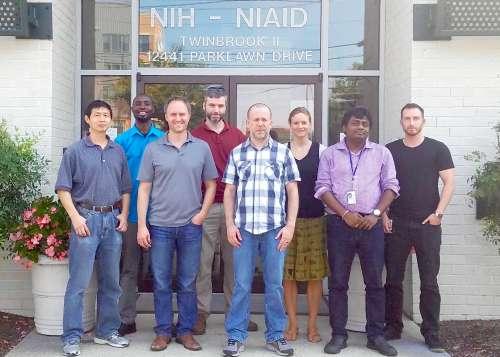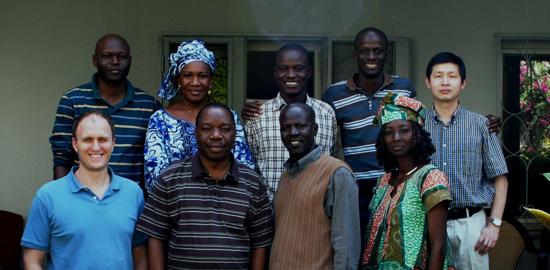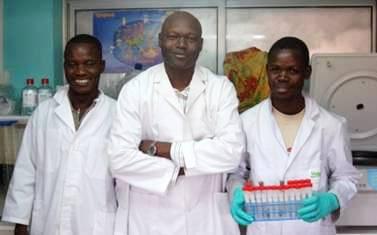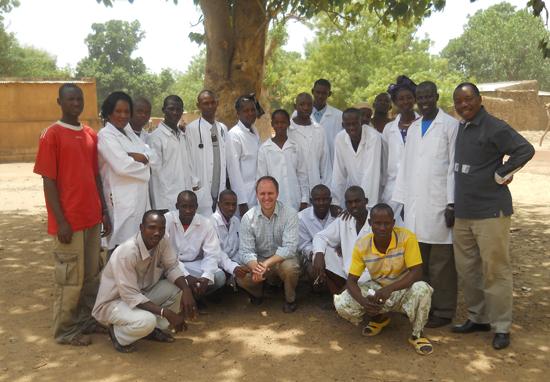Malaria Infection Biology and Immunity Section
Peter D. Crompton, M.D., M.P.H.
Chief, Malaria Infection Biology and Immunity Section

Major Areas of Research
- Mechanisms of naturally acquired immunity to malaria
- Antibody responses to P. falciparum infection
- B- and T-cell biology of P. falciparum infection
- Regulation of P. falciparum-induced inflammation
- Systems immunology of human malaria
- Clinical trials of monoclonal antibodies against malaria
Program Description
Approximately 250 million cases of P. falciparum malaria occur each year, claiming the lives of over half a million children in Africa alone. The development of a highly effective malaria vaccine that confers durable protection would be a key step toward malaria control and elimination. Optimism that a highly effective malaria vaccine can be developed stems in part from the observation that humans can acquire immunity to malaria through repeated P. falciparum infections. However, the nature of the immune response that confers protection against malaria is only partially understood. In the Malaria Infection Biology and Immunity Section (MIBIS), we aim to fill this knowledge gap by applying advances in immunology and genomics-based technology to longitudinal cohort studies in malaria-endemic areas. Ultimately, an improved understanding of the human immune response to P. falciparum infection may provide insights into how protection from malaria can be enhanced through vaccination or other interventions such as monoclonal antibodies. Objectives of ongoing MIBIS projects include the following:
- Obtain high-quality clinical data and biospecimens from longitudinal cohort studies in Mali in which exposure to P. falciparum infection and susceptibility to malaria is determined.
- Gain an understanding the antigen specificity, function, and kinetics of the antibody response to P. falciparum, as well as the B- and T-cell biology that underlies this response.
- Determine the mechanisms by which malaria-induced inflammation is regulated.
- Identify molecular signatures of immunity to malaria through systems biology approaches.
- Define the human and P. falciparum parasite factors that underlie persistent asymptomatic P. falciparum infection in endemic areas.
- Conduct clinical trials of monoclonal antibodies against malaria.
The observational cohort studies and clinical trials we conduct in Mali are made possible through a close collaboration with an experienced team of clinicians and scientists at the Malaria Research and Training Center at the University of Bamako. Our field studies in Mali are supported by the NIAID International Centers for Excellence in Research (ICER) program. In collaboration with our colleagues in Mali, we facilitate the expansion of research capacity by training young Malian scientists, improving laboratory and clinical infrastructure, and enhancing information technology capabilities in Mali.
Biography
Education
M.D., M.P.H., 2000, The Johns Hopkins Schools of Medicine and Public Health, Baltimore, MD
Dr. Crompton received his M.D. and M.P.H. from The Johns Hopkins Schools of Medicine and Public Health in 2000. He then completed a residency in internal medicine at Massachusetts General Hospital/Harvard University in Boston before going on to a fellowship in infectious diseases at NIAID in 2004. After a year of clinical training at NIAID, he earned a diploma in tropical medicine and hygiene at the London School of Hygiene & Tropical Medicine before joining the Laboratory of Immunogenetics in 2005 to pursue his research interest in malaria immunology. In 2016, he became a senior investigator and chief of the Malaria Infection Biology and Immunity Section. Dr. Crompton is certified in internal medicine and infectious disease by the American Board of Internal Medicine.
Clinical Studies
Selected Publications
Cho H, Gonzales-Wartz KK, Huang D, Yuan M, Peterson M, Liang J, Beutler N, Torres JL, Cong Y, Postnikova E, Bangaru S, Talana CA, Shi W, Yang ES, Zhang Y, Leung K, Wang L, Peng L, Skinner J, Li S, Wu NC, Liu H, Dacon C, Moyer T, Cohen M, Zhao M, Lee FE, Weinberg RS, Douagi I, Gross R, Schmaljohn C, Pegu A, Mascola JR, Holbrook M, Nemazee D, Rogers TF, Ward AB, Wilson IA, Crompton PD, Tan J. Bispecific antibodies targeting distinct regions of the spike protein potently neutralize SARS-CoV-2 variants of concern. Sci Transl Med. 2021 Sep 14.
Tan J, Cho H, Pholcharee T, Pereira LS, Doumbo S, Doumtabe D, Flynn BJ, Schön A, Kanatani S, Aylor SO, Oyen D, Vistein R, Wang L, Dillon M, Skinner J, Peterson M, Li S, Idris AH, Molina-Cruz A, Zhao M, Olano LR, Lee PJ, Roth A, Sinnis P, Barillas-Mury C, Kayentao K, Ongoiba A, Francica JR, Traore B, Wilson IA, Seder RA, Crompton PD. Functional human IgA targets a conserved site on malaria sporozoites. Sci Transl Med. 2021 Jun 23;13(599).
Hopp CS, Sekar P, Diouf A, Miura K, Boswell K, Skinner J, Tipton CM, Peterson ME, Chambers MJ, Andrews S, Lu J, Tan J, Li S, Doumbo S, Kayentao K, Ongoiba A, Traore B, Portugal S, Sun PD, Long C, Koup RA, Long EO, McDermott AB, Crompton PD. Plasmodium falciparum-specific IgM B cells dominate in children, expand with malaria, and produce functional IgM. J Exp Med. 2021 Apr 5;218(4).
Guha R, Mathioudaki A, Doumbo S, Doumtabe D, Skinner J, Arora G, Siddiqui S, Li S, Kayentao K, Ongoiba A, Zaugg J, Traore B, Crompton PD. Plasmodium falciparum malaria drives epigenetic reprogramming of human monocytes toward a regulatory phenotype. PLoS Pathog.2021 Apr;17(4):e1009430.
Andrade CM, Fleckenstein H, Thomson-Luque R, Doumbo S, Lima NF, Anderson C, Hibbert J, Hopp CS, Tran TM, Li S, Niangaly M, Cisse H, Doumtabe D, Skinner J, Sturdevant D, Ricklefs S, Virtaneva K, Asghar M, Homann MV, Turner L, Martins J, Allman EL, N'Dri M, Winkler V, Llinás M, Lavazec C, Martens C, Färnert A, Kayentao K, Ongoiba A, Lavstsen T, Osório NS, Otto TD, Recker M, Traore B, Crompton PD, Portugal S. Increased circulation time of Plasmodium falciparum underlies persistent asymptomatic infection in the dry season. Nature Medicine, 2020 Oct 26.
Tran TM, Guha R, Portugal S, Skinner J, Ongoiba A, Bhardwaj J, Jones M, Moebius J, Venepally P, Doumbo S, DeRiso EA, Li S, Vijayan K, Anzick SL, Hart GT, O'Connell EM, Doumbo OK, Kaushansky A, Alter G, Felgner PL, Lorenzi H, Kayentao K, Traore B, Kirkness EF, Crompton PD. A Molecular Signature in Blood Reveals a Role for p53 in Regulating Malaria-Induced Inflammation. Immunity. 2019 Oct 15;51(4):750-765.e10.
Research Group

From left: Shanping Li, Biologist; Nyamekye Obeng-Adjei, Fellow; Peter Crompton, PI; Andrew Orcutt, Biologist; Jeff Skinner, Statistician; Christine Hopp, Fellow; Rajan Guha, Fellow; Anton Goetz, Fellow
Research Group Contact Information
Shanping Li, Biologist
Nyamekye Obeng-Adjei, Fellow
Peter Crompton, PI
Andrew Orcutt, Biologist
Jeff Skinner, Statistician
Christine Hopp, Fellow
Rajan Guha, Fellow
Anton Goetz, Fellow

Malaria Research and Training Center, University of Bamako, Mali. From left to right: (back row) Didier Doumtabe, Pharm.D.; Safiatou Doumbo, M.D.; Abdrahamane Traore, M.D.; Bathily Aboudramane, M.D.; Shanping Li, M.Sc.; (front row) Peter Crompton, M.D., M

Malaria Research and Training Center, University of Bamako, Mali. From left to right: Abdrahamane Traore, M.D.; Didier Doumtabe, Pharm.D.; Younoussou Kone, M.D.

Field research team in Kalifabougou, Mali. The team provides medical care to the study volunteers; records clinical data; and obtains, processes, and transports biospecimens for immunological analyses

